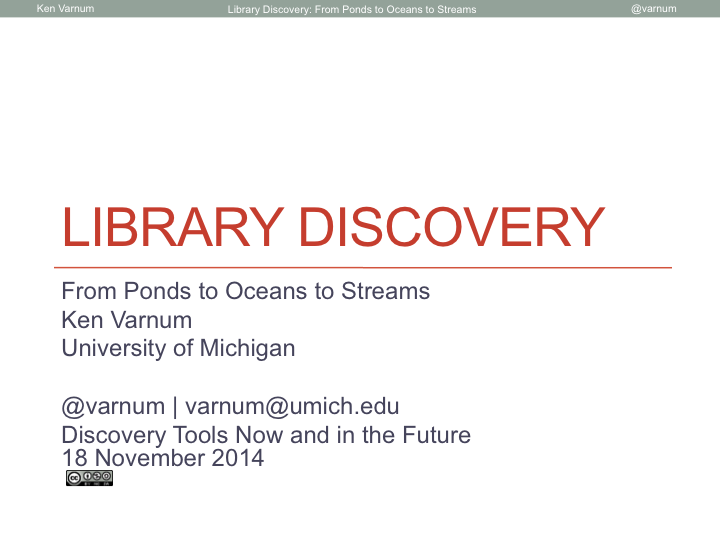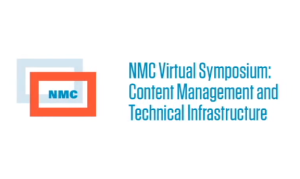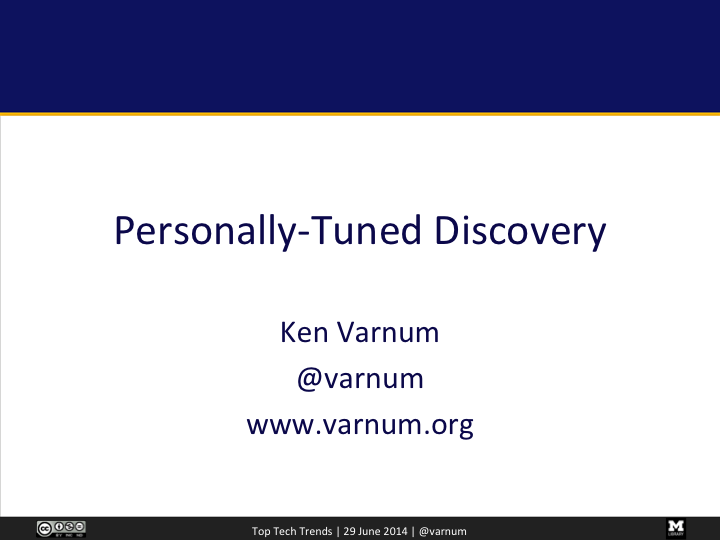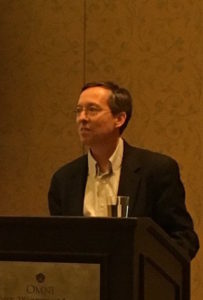 I am a frequent speaker in person at conferences and virtually in online webinars and other settings. See below for a list of presentations and links to slides. Where I can, I post materials in Deep Blue (the University of Michigan’s Institutional Repository, an open-access platform).
I am a frequent speaker in person at conferences and virtually in online webinars and other settings. See below for a list of presentations and links to slides. Where I can, I post materials in Deep Blue (the University of Michigan’s Institutional Repository, an open-access platform).
Interested in having me speak at your event? Get in touch.
Connecting Libraries and Learning Analytics for Student Success (CLLASS)
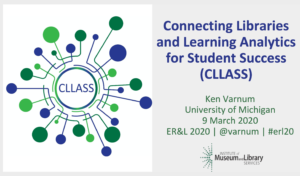 This talk discusses the IMLS National Leadership Grant, “Connecting Libraries and Learning Analytics for Student Success” [LG-97-18-0209-18, awarded to Syracuse University], including the library profiles developed for the Caliper specification and the ways we are addressing privacy concerns at different libraries.
This talk discusses the IMLS National Leadership Grant, “Connecting Libraries and Learning Analytics for Student Success” [LG-97-18-0209-18, awarded to Syracuse University], including the library profiles developed for the Caliper specification and the ways we are addressing privacy concerns at different libraries.
Slides: Connecting Libraries and Learning Analytics for Student Success (CLLASS)
APIs to Enhance the User Experience
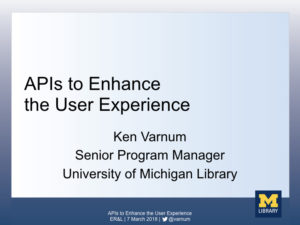 A discussion of how and why the University of Michigan built front ends to the 360 Link knowledge base and the Summon index to provide a locally customized interface for our users. Presented as part of the “Personalizing the Discovery Experience through Custom User Interface Development” session moderated by Katy Aronoff with Jason Thomale. Presented at Electronic Resources & Libraries 2018 in Austin, Texas. March 6, 2018.
A discussion of how and why the University of Michigan built front ends to the 360 Link knowledge base and the Summon index to provide a locally customized interface for our users. Presented as part of the “Personalizing the Discovery Experience through Custom User Interface Development” session moderated by Katy Aronoff with Jason Thomale. Presented at Electronic Resources & Libraries 2018 in Austin, Texas. March 6, 2018.
Slides: APIs to Enhance the User Experience
Customizing Discovery Interfaces: Understanding Users’ Behaviors and Providing Better Service
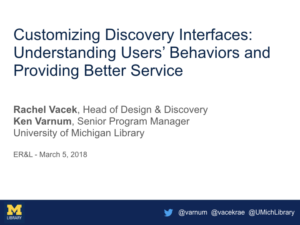 Customizing a library discovery layer using open-source software enables libraries to tailor services to its users, understand user behavior at user, department, and campus levels, and build integrations with library and campus services. Learn how and why a research library built a discovery interface to consolidate multiple interfaces into one. Presented with Rachel Vacek at Electronic Resources & Libraries 2018, Austin, Texas. March 4, 2018.
Customizing a library discovery layer using open-source software enables libraries to tailor services to its users, understand user behavior at user, department, and campus levels, and build integrations with library and campus services. Learn how and why a research library built a discovery interface to consolidate multiple interfaces into one. Presented with Rachel Vacek at Electronic Resources & Libraries 2018, Austin, Texas. March 4, 2018.
Slides: Customizing Discovery Interfaces: Understanding Users’ Behaviors and Providing Better Service
Own the User Experience: Provide Discovery for your Users
In the past several years, discovery systems have come a long way in enabling library staff to customize their user interfaces. However, there are still limitations to what a library can do to meet its particular user community’s needs. Fortunately, technology has advanced to a point where it’s becoming easier to use off-the-shelf, open source components to compliment your discovery index in order to create a highly configurable discovery environment. In this session, learn about how and why the University of Michigan Library chose to build a new discovery interface, the advantages and additional responsibilities of doing so, and considerations for your own discovery environment. Presented with Rachel Vacek at LITA Forum 2017, Denver, Colorado. November 10, 2017.
Slides: Own the User Experience: Provide Discovery for your Users
User Experiences of Accessing Licensed Content
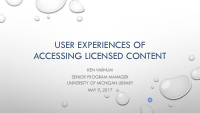 This presentation was part of a panel discussion in the Society for Scholarly Publishing’s Scholarly Kitchen Webinar, “The Future of Access, Authentication, and Privacy” on May 9, 2017. Roger Schonfeld moderated and Ralph Younger and I were panelists. My portion of the presentation focused on the user experience of the current disjointed set of licensed content access options (including proxy servers, VPNs, IP recognition, Shiboleth, and more).
This presentation was part of a panel discussion in the Society for Scholarly Publishing’s Scholarly Kitchen Webinar, “The Future of Access, Authentication, and Privacy” on May 9, 2017. Roger Schonfeld moderated and Ralph Younger and I were panelists. My portion of the presentation focused on the user experience of the current disjointed set of licensed content access options (including proxy servers, VPNs, IP recognition, Shiboleth, and more).
Slides: User Experiences of Accessing Licensed Content
Implementing Library Analytics at the University of Michigan
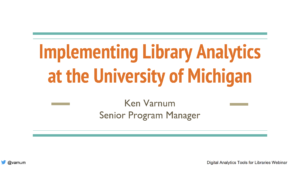 The presentation describes the University of Michigan Library’s new library analytics program and the tools they are implementing to collect data to better understand which online and in-person services provide the most value to the campus’ students and faculty. Presented in the “Digital Analytics Tools for Libraries” webinar hosted by ALA Library Information Technology Association’s Altmetrics and Digital Analytics Interest Group.
The presentation describes the University of Michigan Library’s new library analytics program and the tools they are implementing to collect data to better understand which online and in-person services provide the most value to the campus’ students and faculty. Presented in the “Digital Analytics Tools for Libraries” webinar hosted by ALA Library Information Technology Association’s Altmetrics and Digital Analytics Interest Group.
Slides: Implementing Library Analytics at the University of Michigan
Audio/Video recording (via Google Drive)
NISO Open Discovery Initiative Update
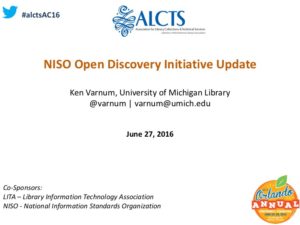 The presentation provides an update on recent activities of the Open Discovery Initiative, including work to promote conformance statements from discovery vendors and content providers, the impact of the ODI process on libraries, and the current state of interoperability among libraries, discovery platforms, and content providers via APIs and other mechanisms. Presented at the American Library Association Annual Conference 2016.
The presentation provides an update on recent activities of the Open Discovery Initiative, including work to promote conformance statements from discovery vendors and content providers, the impact of the ODI process on libraries, and the current state of interoperability among libraries, discovery platforms, and content providers via APIs and other mechanisms. Presented at the American Library Association Annual Conference 2016.
Slides: NISO Open Discovery Initiative Update
Audio/Video recording of the talk
Imagining the Near Future: Technology Forecasting for Your Library
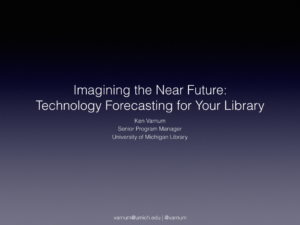 Library technology is constantly evolving, in the first part of this session, Ken Varnum will provide an overview of technologies and tools that are emerging from experimental to practical in academic libraries. Of course, just because a technology emerges into the mainstream doesn’t make it fit your local situation. This presentation and workshop will teach attendees ways to think about their needs and technologies so they can make sound decisions about where to place their technology bets. Presented at Michigan Library Association’s Technologies & Trends 2016
Library technology is constantly evolving, in the first part of this session, Ken Varnum will provide an overview of technologies and tools that are emerging from experimental to practical in academic libraries. Of course, just because a technology emerges into the mainstream doesn’t make it fit your local situation. This presentation and workshop will teach attendees ways to think about their needs and technologies so they can make sound decisions about where to place their technology bets. Presented at Michigan Library Association’s Technologies & Trends 2016
Information Resources: Justifying the Expense
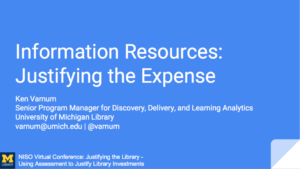
Discovery layers have changed the landscape of resource use for many libraries through their goal of centralizing access to distributed content through a single interface. Yet, for many libraries, services like Google, Mendeley, and others, provide the access point for much resource use. In this presentation, Ken Varnum will discuss assessment tools such as COUNTER and the Open Discovery Initiative that libraries can use to understand resource usage, as well as discuss emerging efforts to evaluate the impact of that use through broader campus-wide learning analytics processes. Presented at the NISO Virtual Conference: Justifying the Library – Using Assessment to Justify Library Investments.
Slides: Information Resources: Justifying the Expense
Libraries & Campus Learning Analytics
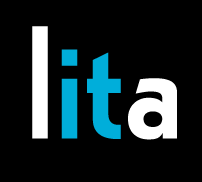 This is a slightly expanded and more linear version of remarks I made during the ALA Midwinter 2016 Top Tech Trends panel in Boston on January 10, 2016. I think I covered all this, and probably more, but these are the main points as I see them.
This is a slightly expanded and more linear version of remarks I made during the ALA Midwinter 2016 Top Tech Trends panel in Boston on January 10, 2016. I think I covered all this, and probably more, but these are the main points as I see them.
Remarks: Libraries & Campus Learning Analytics
Full-Text Links: Fish, or Fishing License?
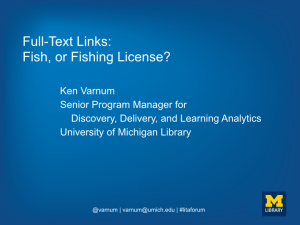 Results from a multi-year effort to gather data on success rates of links accessed through their discovery and link resolver implementation and steps identified to improve linking. Presented at LITA Forum 2015.
Results from a multi-year effort to gather data on success rates of links accessed through their discovery and link resolver implementation and steps identified to improve linking. Presented at LITA Forum 2015.
Slides: Full-Text Links: Fish, or Fishing License?
Web Scale Discovery Services
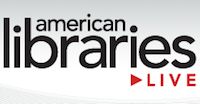 An American Libraries Live discussion of the issues surrounding web scale discovery services, moderated by Marshall Breeding and with panelists Margaret Heller, Kate Silton, and Ken Varnum.
An American Libraries Live discussion of the issues surrounding web scale discovery services, moderated by Marshall Breeding and with panelists Margaret Heller, Kate Silton, and Ken Varnum.
Watch the archived version of the conversation:
Library Discovery: From Ponds to Oceans to Streams
Amigos Virtual Conference: Discovery Tools Now and in the Future
Resource discovery in libraries has undergone a remarkable evolution over the past five years. Libraries, and libraries’ perceptions of the patrons’ needs, have led to the creation and acquisition of “web-scale” discovery services. These new services seek to amalgamate all the online content a library might provide into one bucket. Rather than exploring focused ponds of specialized databases, researchers now swim in oceans of information. What is needed is neither ponds (too small in our interdisciplinary world) or oceans (too broad and deep for most needs), but streams — dynamic, context-aware subsets of the whole, tailored to the researcher’s short- or long-term interests.
Presentation Slides
Virtual Symposium: Future of Libraries
Content Management & Technical Infrastructure
A panel discussion with Annemarie Haar (California College of the Arts), Rachel Vacek (University of Houston), and me, in which we discussed several trends in the NMC Horizon Report: Library Edition. Watch the presentation:
Personally-Tuned Discovery
ALA Annual 2014
As web-scale discovery environments provided by libraries become more inclusive all kinds of content, they will evolve from tools to search oceans of data to tools that will direct appropriate streams of information to information-seekers. Presented at the LITA-sponsored Top Tech Trends panel.
Watch the presentation:
Presentation Slides
Library Favorites and Resource Modeling
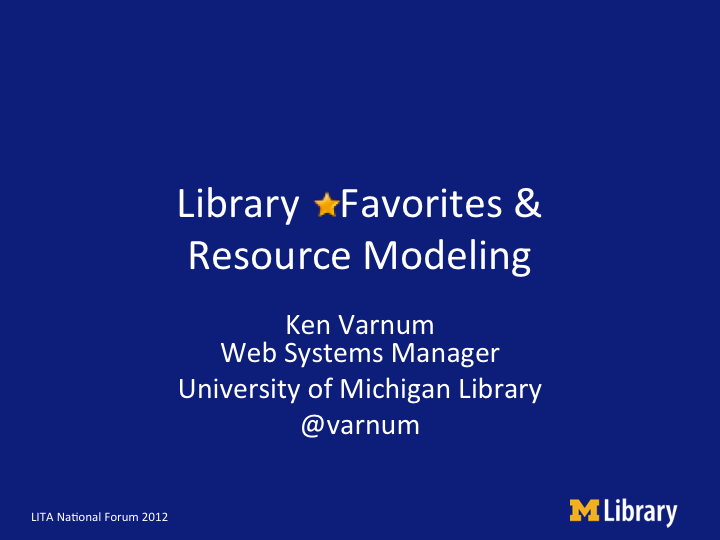
LITA Forum 2013
Web site visitors to the University of Michigan library can save some kinds of resources (catalog items, databases, online journals, and article citations) to their user account for future use. Users can optionally organize these resources into categories (the system recommends courses they are taking and categories they have previously used, but individuals can create any categories they like).
Presentation Slides
Discovery Here, Discovery There: Pros and Cons of Local or Remote Hosting of Discovery Tools
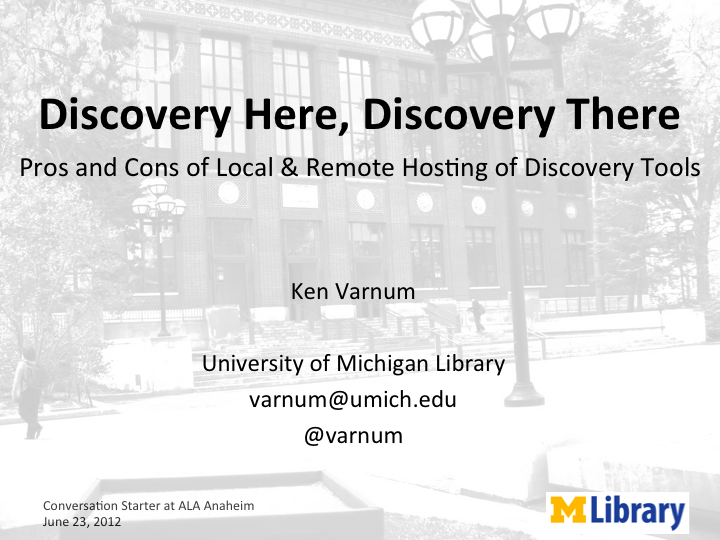
ALA Annual 2012
Discovery systems are powerful tools to help users find information resources across the breadth of the library’s online holdings. Many of these tools offer APIs for libraries to build their own user interfaces to the search index, allowing a library to keep site visitors within the library until the time they access the full text of a resource. What are the pros and cons of keeping discovery local? This talk will explore the user interaction, interface design, and user expectations of such homegrown interfaces.
Presentation Slides
![]() Discovery Here, Discovery There: Pros and Cons of Local or Remote Hosting of Discovery Tools
Discovery Here, Discovery There: Pros and Cons of Local or Remote Hosting of Discovery Tools
Don’t Go There! Providing Discovery Services Locally, Not at a Vendor’s Site
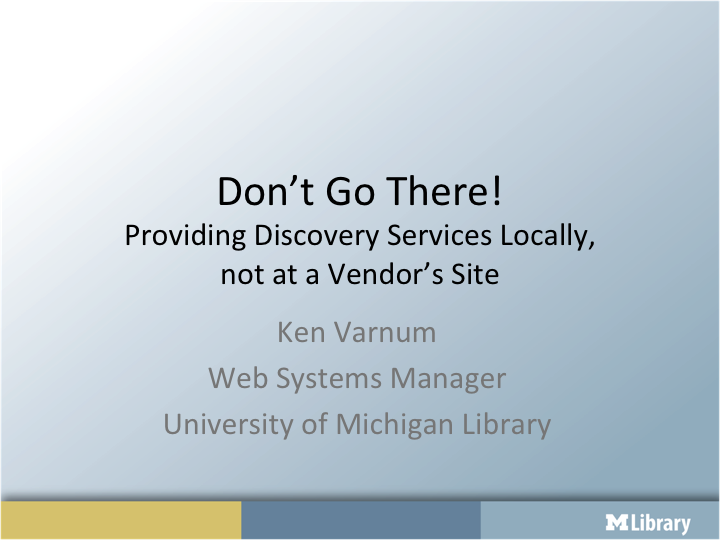
MLA Academic Libraries 2012
A discussion of the advantages of building local interfaces to networked data in a library setting. By controlling the presentation of library, libraries can customize the experience to their users, manage data and access privacy, and add functionality on their own.
Presentation Slides
![]() Don’t Go There! Providing Discovery Services Locally, Not at a Vendor’s Site
Don’t Go There! Providing Discovery Services Locally, Not at a Vendor’s Site
Keeping Discovery in the Library
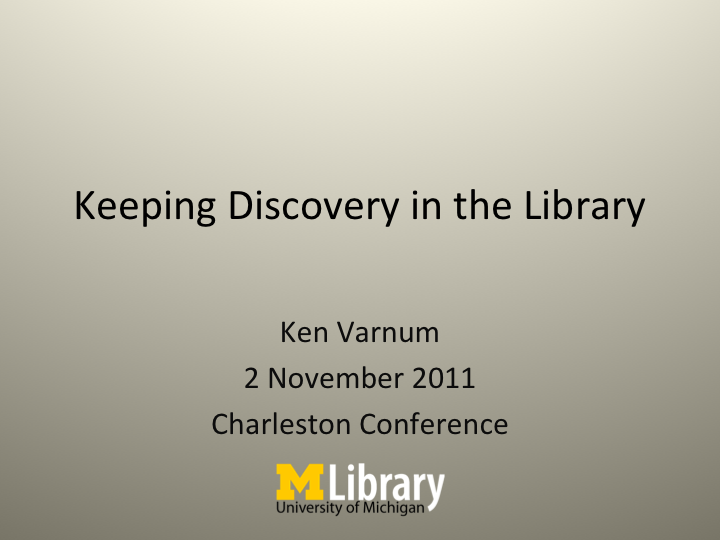
Charleston Conference 2011
Libraries are increasingly faced with the challenge of developing an appropriate strategy for supporting their users’ information discovery needs. This preconference, facilitated by Ithaka S+R, will explore the growing range of approaches users may take to information discovery in a digital environment and help attendees consider the strategic implications of potential roles that their library could play in supporting their users’ discovery needs.
Presented at the 2011 Charleston Conference as part of a panel discussion with Roger Schonfeld (Ithaka S+R), Ross Housewright (Ithaka S+R), Sebastian Hammer (Index Data), Cody Hanson (University of Minnesota), and David Walker (California State University).
Presentation Slides
Making the Case for CMS!
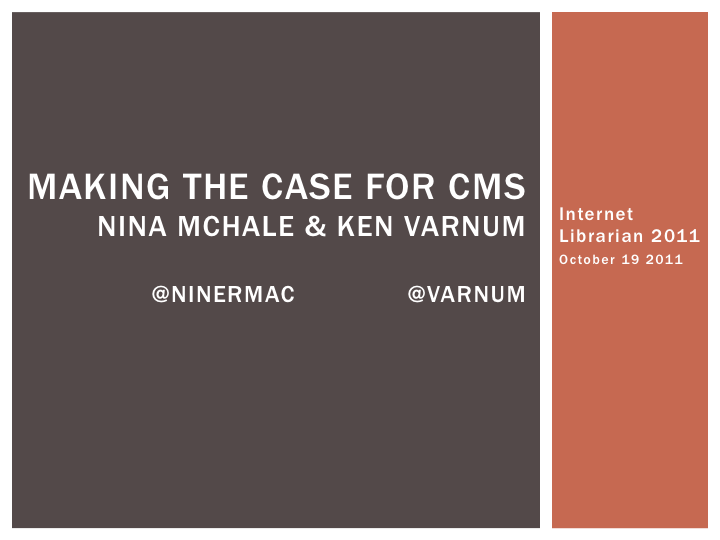
Internet Librarian 2011
Making a convincing case to change from non- or lightly-managed web sites to a content management system (CMS) can seem daunting. However, you can build a strong case that will help convince administration of the benefits of CMSs. In this talk, two librarians who manage large public and internal websites at the University of Michigan and the University of Colorado Denver give you all of the ammo you need! Gain insight on why having a CMS is better than not having one and why an open source CMS tool (such as Drupal and MediaWiki) are viable, functional, and efficient solutions. Presented with Nina McHale.
Presentation Slides
Drupal & Summon: Keeping Article Discovery in the Library
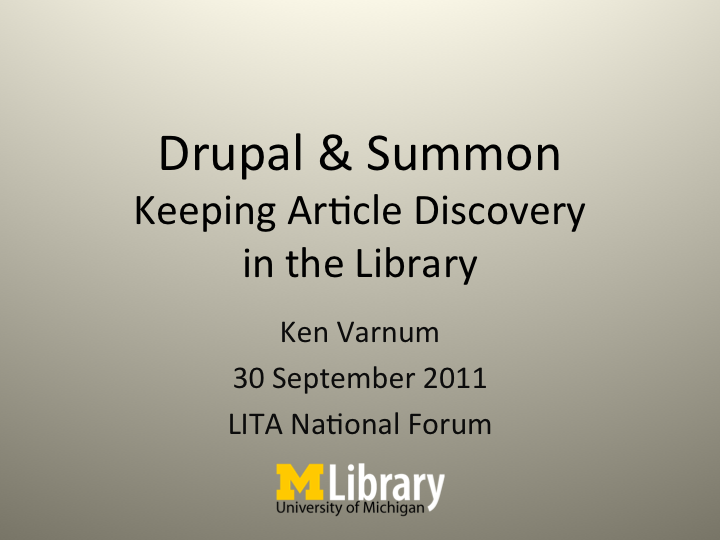
LITA Forum 2011
How building a Drupal module to bring Summon’s article discovery system into our web site increased article searching, decreased direct database use, and maintained context for the library’s patrons.
Presentation Slides
Usability for Tough Times
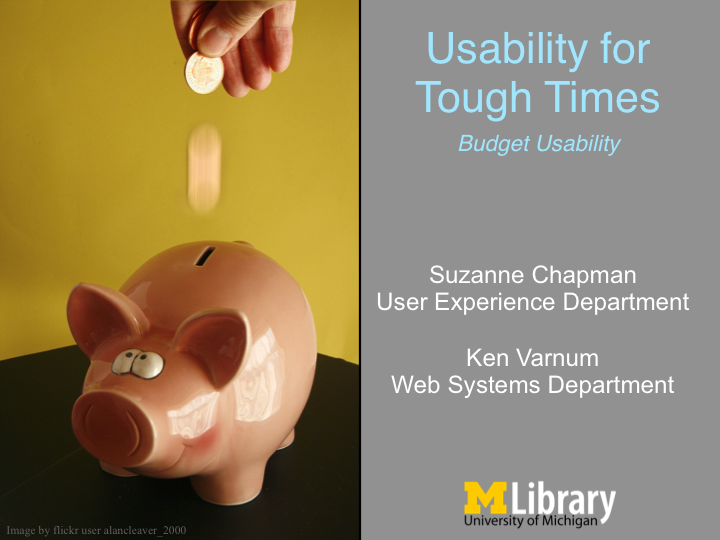
LITA Forum 2010
Like many libraries, the University of Michigan Library for a long time employed no one for the purpose of website usability. To address the gap, a Usability Group was formed. The structure and methodologies of the group have evolved over the last four years, producing an efficient organization with innovative and highly effective techniques. Twenty-eight staff members have contributed to this group. Six different systems have been evaluated, resulting in over 30 reports and hundreds of recommendations. Although resources are evaluated using a wide range of traditional techniques (formal testing, focus groups, surveys, heuristic evaluations, prototype testing, etc.), the group strongly believes that usability doesn’t have to be complicated and time-consuming, favoring more straightforward, “budget” techniques as means to the most interesting and useful results. The group also often employs an iterative approach to testing by repeating and refining tests to evaluate effectiveness of changes and to fine-tune techniques. This presentation will describe the Usability Group’s techniques and findings from our most recent projects to evaluate the library’s recently launched website. Specifically, we will describe methodologies, present testing materials and results from “guerilla” testing, group card sorting, and participatory design sessions with undergraduates, graduates and faculty, and staff. Presented with Suzanne Chapman.
Presentation Slides
Opening What’s Closed: Using Open Source Tools to Tear Down [Vendor] Silos
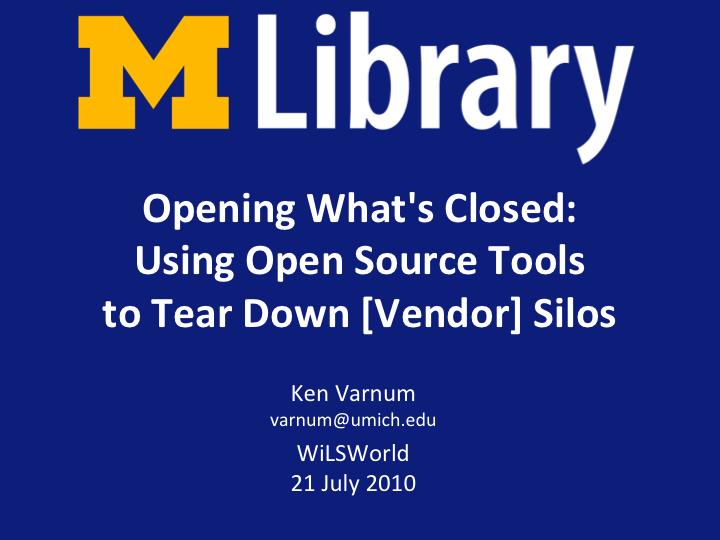
WiLSWorld 2010
The University of Michigan Library’s web site is consistent, integrated front end on what was a collection of a 19 distinctly different library sites and multiple library silos. The library’s site now combines a variety of tools (including Drupal, VuFind, Springshare’s LibGuides, Ex Libris’s Metalib, DSpace, and Solr) within a single interface. In this talk, you will learn about the design process that informed the system architecture and the way we are using data from both open source and proprietary software to break down information silos.
Presentation Slides
![]() Opening What’s Closed: Using Open Source Tools to Tear Down [Vendor] Silos.
Opening What’s Closed: Using Open Source Tools to Tear Down [Vendor] Silos.
Project Lefty More Bang For The Search Buck
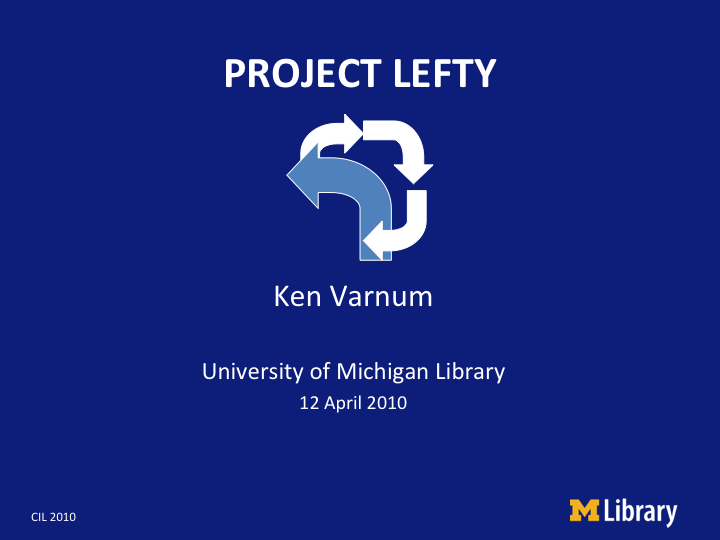
Computers in Libraries 2010
This presentation discusses my winning entry in Deep Web Technology’s federated search contest. The presentation discusses the idealized future as well as a working prototype at the University of Michigan Library. A version of the winning entry was published in the April 2010 issue of Computers in Libraries: Project Lefty: More Bang for the Search Query.
Presentation Slides
Information, Not Location: The New MLibrary
Presented with Liene Karels and Karen Reiman-Sendi as part of the Wisconsin Library Services‘ Library Open Solutions Webinars on 8 April 2010.
Information, Not Location: Putting the What in Front of the Where So Patrons can Find When, Why and How
Presentation Slides. Presented at the NERCOMP New Discovery Tools Symposium
Abstract: At the University of Michigan Library, we recently launched a new library web site that strives to put the library’s resources in the foreground while leaving the particular tools that manage and provide access to them in the background. The site, built on Drupal, VuFind, LibGuides, and Ex Libris’s Metalib, integrates a range of library services without forcing the user to look in specialized interfaces for them. For example, a site search dynamically returns results from the catalog (including materials available through the HathiTrust), our ejournals and databases lists, our web site, research guides, and librarian subject specialists. Our more static browse pages highlight the best resources in each of these categories for our patrons.
Integrating Social Bookmarking into Library Content
Presentation Slides. Presented at the Michigan Library Association 2009 Conference.
Abstract: The University of Michigan library launched MTagger, a social bookmarking tool, during winter 2008. MTagger allows users to add tags to library web pages, catalog records, digital images in the digital library, or to any other web page. The tool is deeply integrated into the alternative library catalog interface (based on VuFind), providing the mechanism for users to select and sort their “favorites.” It is also part of the library’s new Drupal powered web site. In addition to providing ways for library users to save and organize library resources, MTagger overlays saved items with the concept of “collections.” These collections represent the kind of resource (for example, images, catalog items, web pages, journal articles). This allows others to explore the universe of tagged items by kind. MTagger was intended to enhance findability across collections and to expose groups of resources that might otherwise remain “hidden” to particular users.
Designing For Content Rich Sites
Presentation Slides. Presented at Internet Librarian 2009.
Abstract: Webpages, research guides from Springshare’s LibGuides, licensed content, full-text journals, subject experts, digital collections … and books online and offline. How is a library patron to figure out what?s what in this complex environment? Using independently developed tools from various systems to build a seamless whole, the UM library rebuilt its website, bringing the information patrons want into the forefront and the byzantine path to get it in the background. Speakers share results of extensive user studies, how they iteratively designed the site, and discuss the opensource technologies (Solr, Lucene, Drupal, XML, VuFind) that make it work.
Video is available from UStream.
User Responses to Social Bookmarking at MLibrary
Presentation Slides. Presented at Computers in Libraries 2009.
Abstract: MTagger, a social bookmarking tool, launched in the winter of 2008. MTagger allows users to tag a webpage on the library site or anywhere, and catalog records, or digital images. The tool was intended to enhance findability across collections and to expose ?hidden? collections. After launch, the service did not meet our expectations for use, so we embarked on usability testing. This talk covers the questions we asked, why we asked them, and how we’re responding.
Tag! You’re It: Social Bookmarking at MLibrary
Presented at Access 2008.
Abstract: The University of Michigan libraries launched MTagger, a home-grown social bookmark tool, in spring 2008. It allows users to tag individual library web pages, catalog records, digital library images, or any other web page. Through the “collections” feature — metadata assigning each tagged item to one of the library’s physical or online collections — users can broaden or narrow their search for tags. We built the tool to enhance findability across our collections and to expose “hidden” collections to users who might not know they even existed. In this talk, learn about why we built this tool, how it works, how it’s being used, and where we’re going with it. (Listen to the talk [MP3, 30.2 MB].)
Findability: Information, Not Location
Presentation Slides. Presented at Computers in Libraries 2008 with Mike Creech.
Abstract: Learn how to foster user-friendly digital information flows by eliminating silos, highlighting context and improving findability to create a unified web presence. Hear how the University of Michigan Libraries’ (MLibrary) are reinventing the libraries’ web sites to emphasize information over the path users previously took to access it. By elevating information over its location, users are not forced to know which library is the “right” starting place. The talk includes tips for your library web redesign process and user-centric design process.
RSS Basics and Beyond: Tips and Tricks for Getting the Most out of Syndicated Content
Presentation Slides. A talk at The Ohio State University’s Library 2.0 Seminar on June 13, 2007. Talk abstract: An introduction to RSS, feed aggregators, and easy ways libraries can take advantage of RSS to improve communication with their patrons, communities, and staffs. (Available as streaming audio.)
Using RSS to Promote Scholarly Publications (PowerPoint, 1 MB)
I gave this talk at the Dartmouth Biomedical Libraries’ Cool Tools and New Technologies conference on October 27, 2006. The talk abstract: The Ginn Library has created several databases to track and promote scholarly research by our faculty and students. A faculty publications database provides RSS feeds by author- and user-supplied keywords along with a current awareness feed that includes everything published. A second database highlights student master’s theses. Feeds are used internally to populate web pages and externally to promote the school. Learn how we created these two databases.
Intelligent Agents
Presentation Slides. Slides from a talk I gave on Intelligent Agents at the Intranets 2003 conference in Santa Clara, California.
Discusses a project to create individualized informaiton agents to fine-tune e-mail alert services.
Information Architecture at Ford Motor Company
Presentation Slides. This presentation to University of Michigan School of Information course, Information Architecture, October 30, 2001, provides an overview of information architecture practices and processes within the Ford research library.
Function over Form
Presentation Slides. Presentation at Intranets 2000, San Jose, California.
Metadata in Theory and Practice
Presentation Slides. Presentation at Intranets ’99, San Francisco, California.
Case Study: Intranet Redesign at Ford Motor Company
Presentation Slides. Presentation at Intranets ’99, San Francisco, California.
